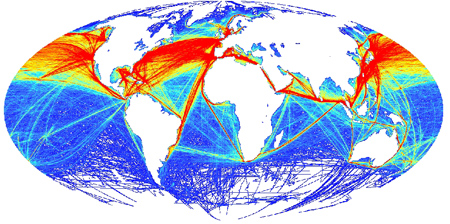I’ve been tossing around an idea here at the New America Foundation for a couple weeks, much to the entertainment of my coworkers. I think it’s worthy of consideration, though: the resurgence of pirates.
This is not, for the record, simply a Halloween post in disguise, though I am considering Sparrow like attire for the weekend.
The LA Times has a piece this morning with an excellent lead: “Straddling a wooden crate filled with $1 million in cash ransom, a cranky old pirate bellows names from a notebook as his anxious, bleary-eyed minions lean against the stone walls of their cramped hideout.”
The story, of course, is from Somalia, the current piracy capital of the world. Some 16,000 ships navigate through the Gulf of Aden each year, with more and more of them coming under attack. The AP reported Thursday that six ships had fended off attacks over the previous two days and that a seventh had been captured. More than 77 ships have been attacked this year in the Gulf, at least 31 one of them falling to captors. Ransoms paid out in 2008 are reported to have topped $30 million.
The business of piracy has become so common that in Hobyo, a village 300 miles north of Mogadishu, all but four of the towns 80 fishing boats are now dedicated to piracy. The infusion of capital into Eyl, the coastal town where captured ships are most often taken, has been so great that a cup of tea, which previously cost only a few cents, is up to roughly a dollar. Prostitutes in Djibouti have reported making $1,000 to $3,000 in a single night.
My thesis, however, is not about Somalia, but rather about the likelihood of replication. I think this is likely a new generation of asymmetrical, economic warfare. The world has become too interconnected for piracy to remain isolated to the Gulf of Aden. Occasional acts of piracy have already been linked to Yemeni vessels, and global news coverage – exacerbated last month by the capture of a ship hauling 33 tanks – assures that knowledge of the effectiveness of the tactic will not remain unique to the horn of Africa.
Global Shipping Routes

I think famines fueled by climate change, along with water shortages towards the midcentury years, are likely to decrease the powers of poor central governments, most dangerously in African coastal states. Major shipping routes across the Maghreb and along the western African coast will be subject to the highest risks. Also, the Straits of Malacca — which has been historically troubled by pirates — and other routes through the South China Sea, will be at heightened risk if weak governments are incapable of adjusting to the challenges of the twenty-first century.
Piracy is cheap, efficient and rewarding, and is likely to become a widely employed tactic unless deterred by host governments. Deterring piracy with naval force is difficult. A recent Chatham House report — which is the most thorough investigation I’ve seen — suggests time between spotting pirates and being overtaken is typically about fifteen minutes. Employing several small, fast, maneuverable boats make evasive measures difficult for large, slow shipping vessels. Even waters heavily patrolled by naval forces — Chatham’s paper states there are 12-15 patrolling naval ships in the Gulf of Aden — are bedeviled by the model.
Pirates armed to the teeth and equipped with GPS, Satellite phones, and motherships for refueling, could be a major challenge to global commerce in the coming decade.
Beware of Sparrow’s revenge, and happy Halloween.
— Brian Till


15 comments on “Jack Sparrow’s Revenge”